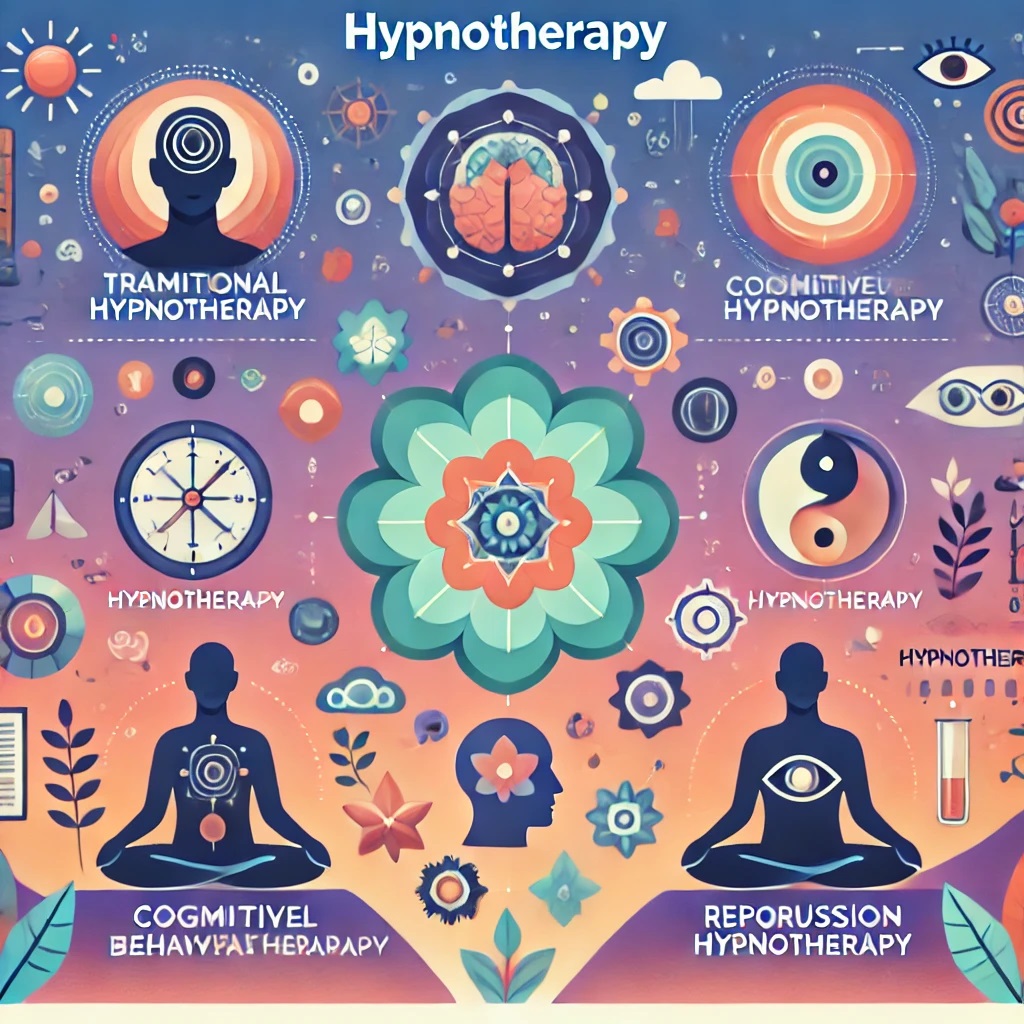
HYPNOTHERAPY
What is Hypnotherapy?
 Hypnotherapy is a therapeutic technique that uses hypnosis to help individuals reach a state of focused relaxation and heightened suggestibility. This state, often referred to as a trance or hypnotic state, allows the therapist to work with the subconscious mind to facilitate positive changes in thought patterns, behaviours and emotional responses. Hypnotherapy is not about controlling the mind but rather guiding individuals to access deeper parts of their consciousness, enabling them to address underlying issues and unlock their potential for healing and personal growth.
Hypnotherapy is a therapeutic technique that uses hypnosis to help individuals reach a state of focused relaxation and heightened suggestibility. This state, often referred to as a trance or hypnotic state, allows the therapist to work with the subconscious mind to facilitate positive changes in thought patterns, behaviours and emotional responses. Hypnotherapy is not about controlling the mind but rather guiding individuals to access deeper parts of their consciousness, enabling them to address underlying issues and unlock their potential for healing and personal growth.
How Does Hypnotherapy Work?
 Hypnotherapy works by inducing a state of deep relaxation where the conscious mind becomes quiet and the subconscious mind becomes more open to suggestion. During this state, the therapist uses guided imagery, positive suggestions, or metaphors to help the individual modify certain behaviours, thoughts, or emotions.
Hypnotherapy works by inducing a state of deep relaxation where the conscious mind becomes quiet and the subconscious mind becomes more open to suggestion. During this state, the therapist uses guided imagery, positive suggestions, or metaphors to help the individual modify certain behaviours, thoughts, or emotions.
Here’s a step-by-step process of how hypnotherapy typically works:
- Induction: The therapist guides the individual into a relaxed state using calming words, imagery, or breathing techniques. This is known as the induction phase, where the individual gradually enters a state of deep relaxation or trance.
- Deepening: The therapist helps deepen this relaxed state, often by guiding the individual to focus on specific imagery, bodily sensations, or verbal suggestions. This phase prepares the subconscious mind for therapeutic work.
- Therapeutic Suggestions: In this trance state, the therapist introduces positive suggestions that target specific issues. These suggestions can help change thought patterns, reframe negative behaviours, or address emotional concerns. Since the subconscious mind is more open in this state, the suggestions are more likely to be accepted.
- Awakening: After the therapeutic work is done, the therapist gently brings the individual out of the trance state, guiding them back to full consciousness, often feeling calm and refreshed.
Forms of Hypnotherapy

There are several types of hypnotherapy, each with a different approach to addressing mental and emotional issues. Common forms include:
Traditional Hypnotherapy: This form uses direct suggestions to bring about positive changes. For instance, a therapist may suggest to a smoker under hypnosis, "You no longer feel the desire to smoke."
Ericksonian Hypnotherapy: Developed by Dr. Milton Erickson, this form is more indirect. It uses metaphors, storytelling and indirect suggestions to access the subconscious mind and initiate change.
Cognitive-Behavioural Hypnotherapy (CBH): This combines cognitive behavioural therapy (CBT) with hypnosis. It helps individuals change their thought patterns and behaviours through suggestion while in a hypnotic state.
Regression Hypnotherapy: In this approach, individuals are guided to revisit past events, often from childhood, to gain insights and resolve traumas or unresolved emotions that affect their current lives.
Solution-Focused Hypnotherapy: This is a goal-oriented approach that focuses on finding solutions to specific issues, like anxiety or addiction, rather than revisiting past experiences.
Neuro-Linguistic Programming (NLP) Hypnotherapy: NLP techniques can be used in combination with hypnosis to help rewire how individuals perceive and respond to certain situations, by changing language patterns and thought processes.
Issues Suitable for Hypnotherapy
 Hypnotherapy can be effective in treating a wide range of issues, including:
Hypnotherapy can be effective in treating a wide range of issues, including:
Stress and Anxiety: Hypnotherapy helps people enter a deeply relaxed state, reducing overall stress and anxiety levels. It also helps reframe anxious thoughts and triggers in the subconscious.
Phobias and Fears: By accessing the subconscious mind, hypnotherapy can help reprogram the fear response to specific triggers, such as flying, public speaking, or heights.
Habit Control (e.g., Smoking Cessation, Nail Biting, Overeating): Hypnotherapy is widely used to help people break unwanted habits by suggesting healthier alternatives to the subconscious mind.
Pain Management: Hypnosis can alter the perception of pain by helping individuals focus away from discomfort. It’s used to manage chronic pain or during labour and surgery (as a complementary method).
Weight Loss: Hypnotherapy helps individuals change their attitudes and behaviours towards food and exercise, promoting healthier habits that lead to sustainable weight loss.
Sleep Disorders (e.g., Insomnia): Hypnotherapy can improve sleep by addressing underlying anxiety, stress, or disruptive thought patterns that prevent restful sleep.
Addictions (e.g., Alcohol, Gambling): It is sometimes used to address the psychological triggers behind addictions, helping individuals gain control over their urges.
Self-Esteem and Confidence Issues: Hypnotherapy helps to address negative self-beliefs at the subconscious level, fostering higher self-esteem and greater confidence.
Trauma and PTSD: Regression hypnotherapy can help individuals revisit and resolve traumatic events safely, allowing for emotional healing.
Depression: Though it is not a standalone treatment, hypnotherapy may be used in conjunction with other therapies to help individuals reframe negative thoughts and find emotional balance.
Why Choose Hypnotherapy?
 People choose hypnotherapy for a variety of reasons:
People choose hypnotherapy for a variety of reasons:
Access to the Subconscious Mind: Hypnotherapy allows individuals to work directly with their subconscious, where deep-seated beliefs, habits and emotions reside. This can lead to profound and lasting changes.
Non-Invasive Approach: Unlike medications, hypnotherapy is a natural, non-invasive method that promotes healing through relaxation and mental focus.
Holistic Treatment: It addresses both emotional and mental patterns that might be contributing to physical issues (e.g., stress-induced headaches, IBS), making it a holistic form of therapy.
Personal Empowerment: Hypnotherapy often helps individuals feel more in control of their thoughts and behaviours, leading to increased self-awareness and personal growth.
Versatile and Adaptive: It can be customized to address a wide range of issues, from emotional healing to habit control, making it a versatile option for many.
Support for Other Therapies: Hypnotherapy can complement other therapeutic approaches (like CBT, psychotherapy, or medication), enhancing their effectiveness.
In conclusion, hypnotherapy is an effective, adaptable therapeutic approach that helps individuals address a wide range of emotional, mental and physical issues by tapping into the power of the subconscious mind. Through guided relaxation and focused suggestions, it can lead to meaningful and lasting changes, making it an appealing option for those looking for non-invasive, holistic treatments.

HOW CAN WE ASSIST?